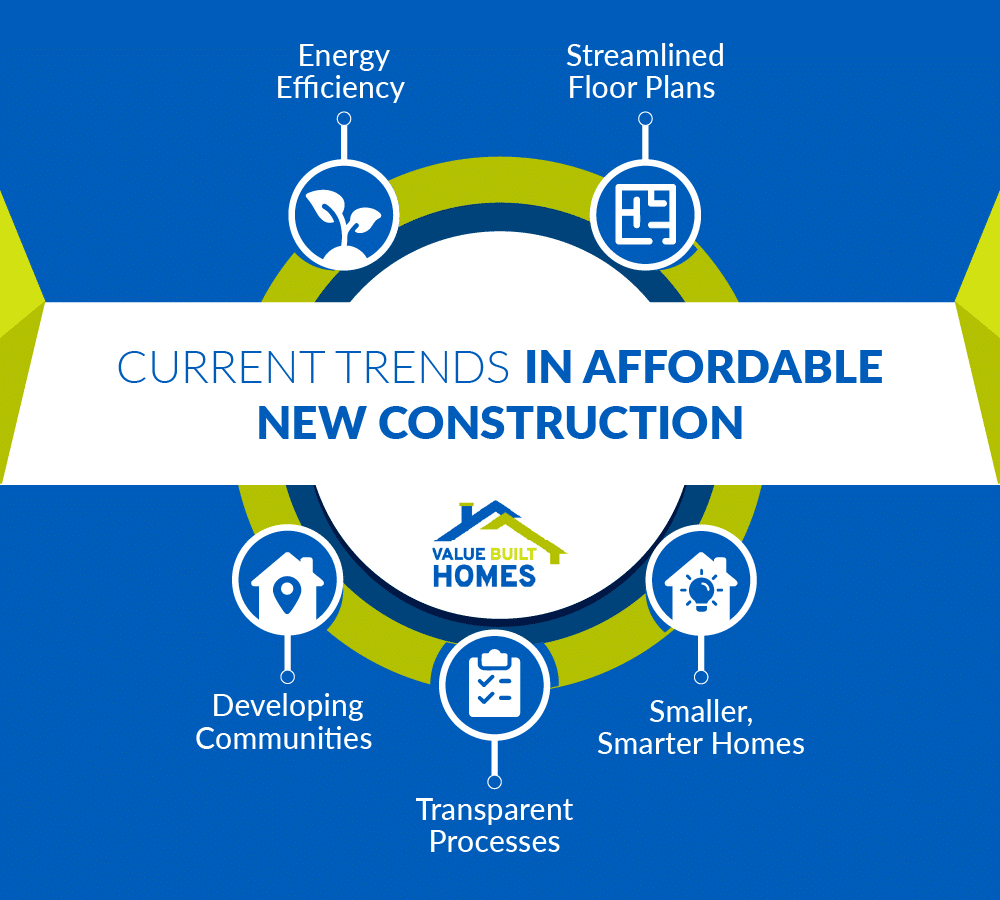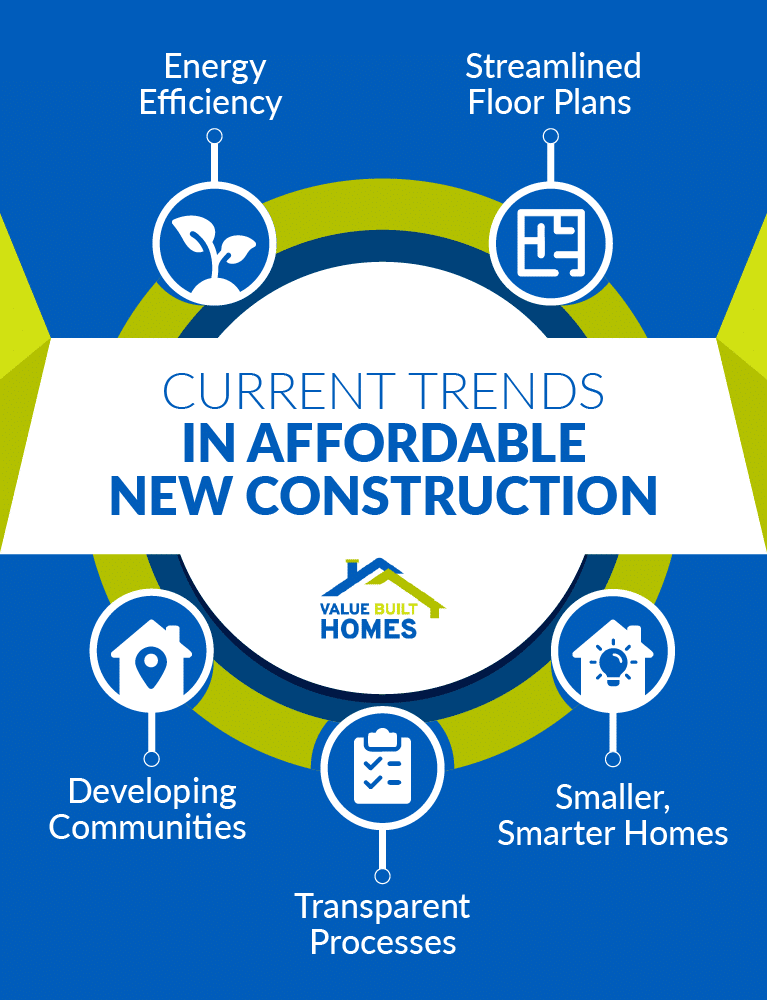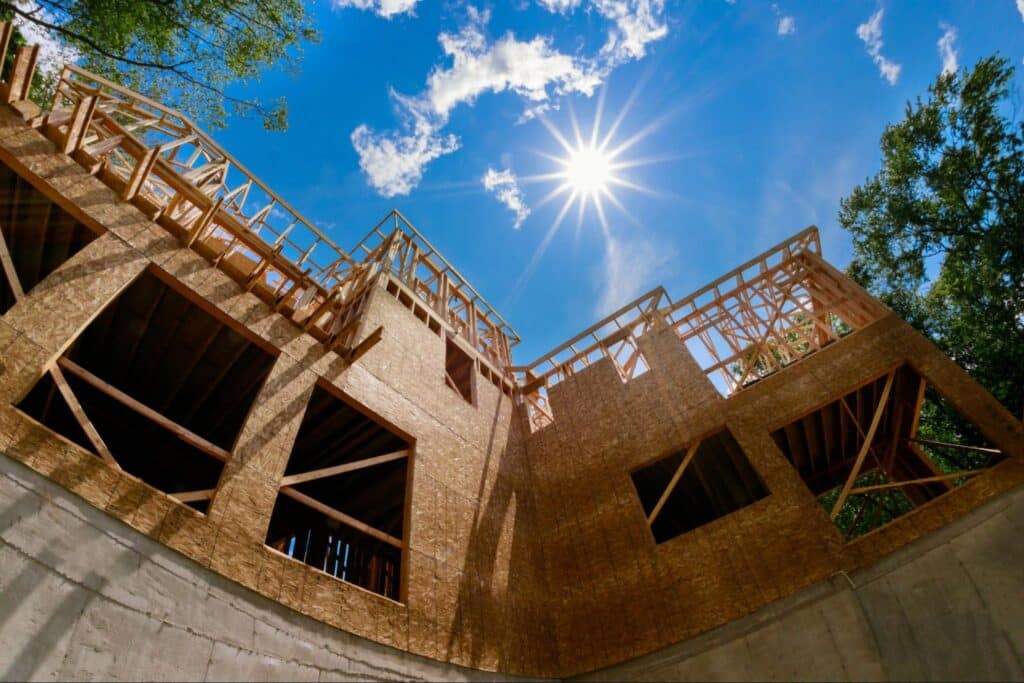The dream of owning a home is more attainable than ever, especially with the increasing availability of affordable new construction homes. In today’s evolving housing market, homebuyers are looking for solutions that offer low-cost options, energy efficiency, and faster move-in readiness following completion. Many buyers are also attracted to the prospect of having a home built to energy-efficient standards with transparent pricing and realistic completion timelines.
As the construction industry adapts to modern demands, innovations are created to simplify the home building process, reduce maintenance issues, and deliver modern design features. This article outlines essential tips to guide first-time buyers and budget-conscious individuals through the landscape of new construction homes. It explains market trends, highlights builder attributes, and offers practical advice to help ensure an informed buying decision.
Benefits of Choosing Affordable New Construction Homes
Affordable new construction homes carry several notable benefits that make them an attractive option for many homebuyers.
Customization Within Budget-Friendly Parameters
One of the most appealing advantages is the ability to customize within preset parameters. Builders often offer standardized floor plans that cut down on unnecessary features and reduce costs considerably. For reference, Value Built Homes floor plans range from 2 to 5 bedrooms, providing a variety of options. Buyers can enjoy personal touches while sticking to a budget. This balance plays an important role when planning around future maintenance, energy costs, and resale value.
Energy Efficiency and Long-Term Cost Savings
Modern building techniques have advanced to deliver excellent energy efficiency. Homeowners can expect features such as advanced insulation, energy-saving windows, and state-of-the-art HVAC systems that minimize utility bills over time. With rising energy prices and growing environmental concerns, these homes support a greener lifestyle and offer significant long-term savings. For more ways to save, many builders also highlight green building practices that positively impact both the environment and your wallet.
Reduced Maintenance Compared to Older Homes
New construction means newer materials, updated technology, and robust building codes. This translates to fewer repairs and lower maintenance costs compared to many older properties. Buyers benefit from modern finishes and minimal wear and tear. Some builders even include warranties that cover potential issues during the first years of ownership, offering further peace of mind.
Modern Design Features and Technological Integration
The design of new construction homes places emphasis on open floor plans, modern appliances, and integrated smart home technology. Homebuyers today expect spaces that are both practical and stylish. Incorporating advanced tech features such as programmable thermostats and security systems adds convenience and increases overall home value.
Faster Move-In Timelines
Reputable builders of new construction homes generally employ standardized methods and streamlined building processes that help speed up construction timelines. In many cases, once construction is complete, buyers can move in relatively quickly – although final inspections, walkthroughs, and closing procedures may add a short delay before full occupancy is possible.
Current Trends in the Affordable New Construction Market


The affordable new construction market is dynamic, driven by trends that prioritize value, efficiency, and modern living. Understanding these shifts can empower you to make smarter home buying decisions. Here are key trends to watch:
Energy Efficiency Takes Center Stage
Builders are increasingly prioritizing energy-efficient materials and designs, moving beyond basic requirements. Expect to see features like advanced insulation, high-performance windows, and eco-friendly materials becoming standard. This isn’t just about environmental responsibility; it translates directly to lower utility bills and long-term cost savings for homeowners, making your home more affordable to live in.
Streamlined Floor Plans for Smart Savings
To maximize affordability, many builders are embracing standardized floor plans. These pre-designed layouts reduce construction complexity and material waste, leading to significant cost reductions. While “standard” might sound limiting, it allows builders to offer attractive price points while still incorporating modern design principles and ensuring efficient use of space. This means you get a well-designed home without paying for unnecessary custom features.
Growth in Developing Communities Offers Opportunity
Keep an eye on developing suburban and emerging communities. These areas often present more affordable land costs and incentives for new construction. Fueled by regional investments and infrastructure growth, these locations can offer attractive entry points into homeownership. While established areas have their appeal, exploring up-and-coming locations can unlock significant affordability advantages.
A Focus on Transparent and Streamlined Processes
Modern builders understand that a stress-free buying experience is crucial. You’ll find a growing emphasis on transparent pricing, clear communication, and simplified processes. Expect upfront cost breakdowns, well-defined package options, and digital tools to keep you informed throughout the construction journey. This transparency builds trust and helps you avoid unexpected costs and anxieties.
Smaller, Smarter Homes are in Demand
Reflecting a shift towards practicality and efficient living, smaller, well-designed homes are gaining popularity. Builders are responding with floor plans that maximize usable space without unnecessary square footage. This trend caters to buyers seeking to minimize costs, reduce maintenance, and embrace a more sustainable lifestyle. Smaller doesn’t mean cramped; it means thoughtfully designed for modern needs.
What to Look for in a New Construction Builder
Your builder is more than just a contractor; they are the architect of your dream home. Selecting the right builder is arguably the most crucial decision in your new construction journey. It can be the difference between a smooth, exciting process and a stressful, costly ordeal. Before you move forward, carefully consider these key factors.
Reputation and Industry Experience
A builder’s reputation often reflects the quality and dependability of their work. Experienced builders with a strong track record offer peace of mind. It is essential to research reviews, ask for referrals, and verify relevant licenses as part of your evaluation process.
Transparency Around Pricing, Contracts, and Features
When selecting a builder, buyers should prioritize clear and honest communication regarding pricing structures and contract details. Comprehensive contracts should detail any potential additional charges, such as site preparation, utility hookups, and customization fees.
Flexible Floor Plan Options
While standardized floor plans are essential for cost-efficiency, some degree of customization can be a welcome bonus. Look for reputable builders who offer a range of options to personalize your home within their efficient building model. This allows you to add your personal touch without sacrificing affordability.
Comprehensive Support During the Building Process
Support during construction—such as detailed warranties, progress updates, and responsive customer service—is invaluable. Buyers should feel confident that potential issues will be addressed promptly, ensuring a smooth transition from design to move-in.
Considerations When Buying a New Construction Home This Year
Before making a final decision, buyers must consider several factors that extend beyond the builder’s reputation and initial pricing.
Evaluating Costs Beyond the Base Price
The base price of a home does not always account for all final costs. Expenses such as purchasing land, site preparation, utility hookups, and optional upgrades can quickly add up. Buyers should create a detailed budget that considers all related costs.
Understanding the Builder’s Timeline and Construction Process
Different builders offer varying timelines for project completion. While many new construction homes are ready for occupancy relatively quickly once the building phase concludes, final steps such as inspections and closing procedures might extend the timeline slightly. It is important to receive a clear construction schedule—from groundbreaking to the final walkthrough—and inquire about potential delays or contingency plans.
Reviewing Contracts Carefully and Asking Questions
A thorough contract review is an integral part of the home buying process. Every term should be examined for clarity regarding what is included and any extra charges that might apply. It is wise to ask for a summary of key clauses, such as cancellation policies, warranty periods, and definitions of additional costs, to avoid confusion.
Researching the Location and Surrounding Amenities
The location of your new construction home is as important as its design and price. Buyers should investigate aspects like schools, healthcare facilities, shopping centers, and recreational areas. Communities such as Poulton Place in Boonville or Willow Crossing in Evansville highlight convenient local amenities that can enhance daily life and potentially boost property values over time.
Tips for First-Time Buyers of New Construction Homes
For those entering the real estate market for the first time, the process can seem overwhelming. However, a few practical tips can ease the transition and help ensure a well-informed decision.
Secure Financing and Set a Clear Budget
Before beginning your home search, secure pre-approval for financing. A clearly defined budget helps buyers focus on properties within their financial reach. Pre-approval also demonstrates to builders that you are serious and financially prepared, potentially streamlining negotiations.
Visit Model Homes to Get a Realistic Sense of Options
Visiting model homes is an invaluable exercise. It gives a tangible impression of layout, finishes, and overall design quality. Observing homes at various stages—from initial designs to nearly completed units—can highlight how construction quality and design details evolve over time.
Inspect Homes During Each Phase of Construction
Many buyers overlook the importance of inspections through various construction phases. Regular site visits during foundation, framing, and finishing phases help ensure that all construction standards are met. Hiring an independent inspector for each phase can help identify potential issues early and safeguard your investment.
Understand the Value of Warranties and Post-Construction Support
Robust warranties and proactive post-construction builder support provide valuable protection after moving in. Warranties that cover structural components, appliances, and workmanship can help mitigate unforeseen issues. Reviewing warranty terms and understanding the claims process ensures you’re covered against potential future problems.
Collaborate with a Trusted Real Estate Agent Specializing in New Builds
Navigating the new construction market can be challenging without expert guidance. A real estate agent specializing in new builds can assist negotiations, offer market insights, and serve as a liaison between buyers and builders. Their familiarity with builder reputations and local market trends can be especially beneficial for first-time buyers.
Common Mistakes to Avoid When Buying New Construction
Even with careful planning, common pitfalls can derail the home buying experience. Recognizing these mistakes can pave the way for a successful purchase.
Over-Customizing Beyond Necessity
While customization can be appealing, excessively personalized changes may lead to cost escalations. Buyers might be tempted to add luxury features that substantially increase overall prices. Often, sticking with standard options helps maintain affordability.
Underestimating Additional Costs
Focusing solely on the base price can lead to surprises. Costs such as landscaping, upgraded fixtures, and additional interior work can add up quickly. Planning ahead and including a contingency fund in your budget can help prevent unexpected expenses.
Skipping Due Diligence When Choosing a Builder
Selecting the wrong builder can result in extended construction timelines, hidden fees, and subpar quality. It is critical to thoroughly research, verify credentials, and speak with previous customers. Overlooking these steps can lead to significant quality and financial issues later.
Failing to Consider Future Resale Value
Understanding market trends and potential property appreciation plays a vital role in long-term investment value. Research local developments, demographic changes, and ongoing infrastructure improvements to ensure that your purchase retains or increases in value over time.
The Importance of Location in Affordable New Construction Homes
Location remains a pivotal factor in real estate, affecting both everyday comfort and long-term investment potential. When assessing a new construction home, consider not just its design but also its surrounding community and amenities.
Why Location Matters
Your daily comfort is directly impacted by commute times, access to educational and healthcare facilities, and overall neighborhood quality. A favorable location typically helps preserve or enhance a home’s resale value over time. Evaluate convenience to work, leisure activities, and public infrastructure when choosing a location.
Popular Areas in Indiana
For buyers interested in affordable homes in Indiana, certain areas—such as Evansville and Newburgh—have shown promising growth driven by substantial investments. While some smaller communities like Boonville, Petersburg, and Vincennes are emerging, detailed data on these areas is still evolving as local developments continue.
Advantages of Building in Developing Communities
Developing communities often feature planned infrastructure improvements and an expanding array of local services. Such neighborhoods may integrate modern technologies and efficiency standards, which can support long-term property value growth.
Step-by-Step Guide to the New Construction Home Buying Process
Navigating the home buying process from start to finish can be straightforward when approached systematically.
Selecting the Right Home Design and Floor Plan
Begin by exploring available floor plans that align with your family’s needs. Consider factors such as the number of bedrooms, bathrooms, and overall square footage to ensure the design meets your lifestyle and budget. For inspiration, review options such as the Sparrow or Finch floor plans.
Understanding Permitting, Inspections, and Construction Timelines
Before construction begins, confirm that all required permits have been secured. Familiarize yourself with scheduled inspection phases during the build process. Request a detailed timeline from your builder that outlines major milestones from foundation to final finishing touches.
Coordinating Financing and Closing Processes
Work closely with your lender to secure financing that meets your project needs. Ensure that all financial documents are in order to minimize delays at closing. Carefully review mortgage terms to guarantee that they align with your long-term homeownership objectives.
Final Walkthroughs and Inspections Before Possession
Once construction is complete, conduct a detailed final walkthrough to identify any issues or incomplete work that must be addressed. Document discrepancies and promptly communicate with your builder to facilitate timely resolution before taking possession of your new home.
Building a Brighter Future: The Promise of New Construction
While the affordable new construction home market shows promising enhancements such as streamlined permitting processes and clearer pricing, buyers should be mindful of persistent challenges like high material costs and labor shortages. These factors mean that while many modern features and efficiencies are coming to market, careful research and planning remain essential.
With affordability, energy efficiency, and modern designs continuing to drive new construction trends, buyers have opportunities to invest in quality properties that incorporate forward-thinking building practices. However, it is important to remember that final move-in timing may vary slightly due to necessary inspections and administrative closing details.
By carefully evaluating market trends, choosing a reputable builder, and planning for all associated costs—including those beyond the base price—buyers can secure an investment that meets both immediate needs and long-term financial goals. Now is the time to explore affordable new construction homes built with modern technologies, efficient processes, and thoughtful design aimed at tomorrow’s challenges.
Your journey to owning a quality, affordable new construction home begins today. Make an informed choice, work with knowledgeable professionals, and embrace a home purchase that is not only modern and energy efficient but also designed to evolve with changing market dynamics and personal needs.
For further details on cost-efficient options, builder resources, and more expert insights, contact Value Built Homes.





